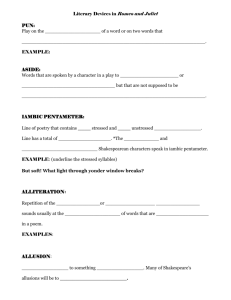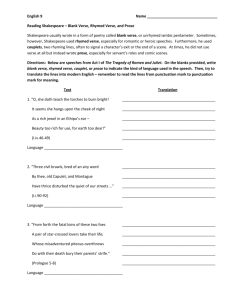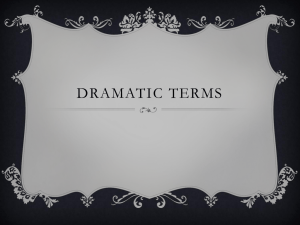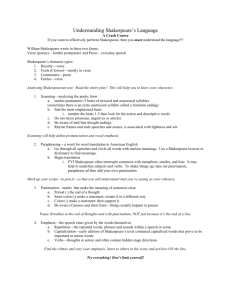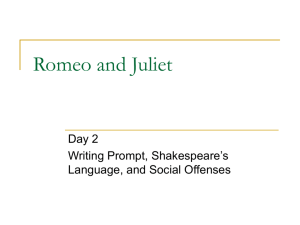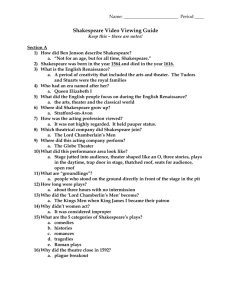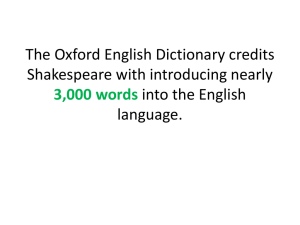Shakespeare's Language
advertisement
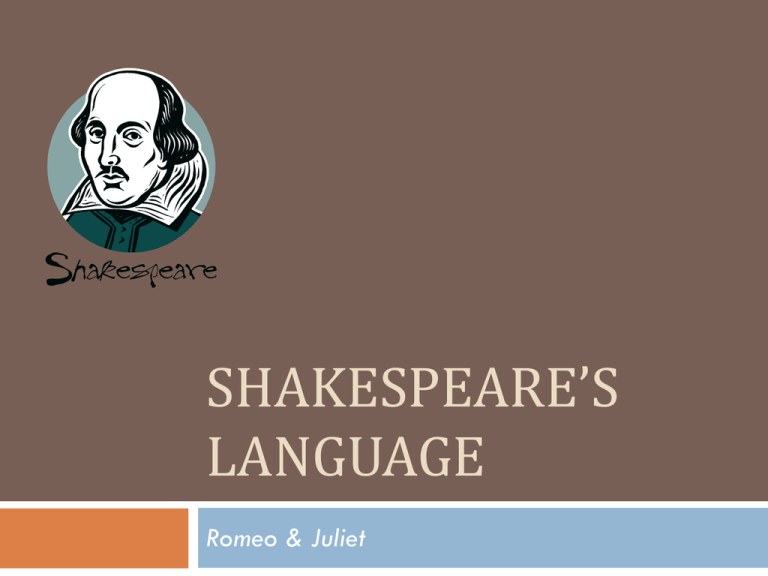
SHAKESPEARE’S LANGUAGE Romeo & Juliet Shakespeare’s English Shakespeare did not write in Old English or Middle English. Shakespeare wrote in Early Modern English. Early Modern English is only one generation of language from the English you speak today! Shakespeare’s Contributions Shakespeare only had an 8th grade education. There were no dictionaries. Shakespeare is credited by the Oxford English Dictionary with the introduction of nearly 3,000 words into the language. His vocabulary numbers upward of 17,000 words (quadruple that of an average, well-educated conversationalist in the language) A Few Words By Shakespeare Accused Addiction Admirable Assassination Bloodstained Cold-blooded Coldhearted Deafening Disgraceful To drug Excitement Fashionable Fortune-teller Gloomy Mimic Obscene Phrases Coined by Shakespeare As good luck would have it Be-all and the end-all Break the ice Eaten me out of house and home Elbow room Fool's paradise For goodness' sake Full circle Good riddance It was Greek to me Heart of gold In a pickle Kill with kindness Lie low Love is blind Not slept one wink Shakespeare’s English In the England of Shakespeare's time, English was a lot more flexible as a language. The most common simple sentence in modern English follows a familiar pattern: Subject (S), Verb (V), Object (O). (Will caught the ball). However, Shakespeare was much more at liberty to switch these three basic components Shakespeare used a great deal of SOV inversion (Will the ball caught). Shakespeare’s English Switching the S-V-O order to S-O-V made it easier for Shakespeare to rhyme and to manipulate his words to flow easily in poems and plays. Shakespeare could effectively place the metrical stress wherever he needed it most by switching word order Shakespeare also used an O-S-V construction (The ball Will caught) for the same reasons. Inverted Word Order Lady Montague: O where is Romeo, saw you him today? Right glad I am he was not at this fray. Translation: O where is Romeo; did you see him today? I am very glad he was not in this fight. Inverted Word Order “Thou hast by moonlight at her window sung.” Translation: You have sung at her window in the moonlight. From A Midsummer Night’s Dream Shakespeare’s Language in Plays The language used by Shakespeare in his plays is in one of three forms Prose Rhymed Verse Blank Verse Prose Prose is writing which resembles everyday speech Prose is often used by Shakespeare for lowerclass characters in his plays Prose lacks meter and rhyme and is informal Shakespeare blends prose with poetry in his plays Rhymed Verse The majority of Shakespeare’s plays contain rhymed verse which looks like poetry Characters– especially of the higher classes--speak in poetic form Their words have form, meter, and rhyme Rhymed verse in Shakespeare's plays is usually in rhymed couplets, i.e. two successive lines of verse of which the final words rhyme with another. Iambic Pentameter Iambic pentameter is meter that Shakespeare nearly always when writing in verse. Most of his plays were written in iambic pentameter. Iambic Pentameter has: Ten syllables in each line Five pairs of alternating unstressed and stressed syllables The rhythm in each line sounds like: ba-BUM / ba-BUM / ba-BUM / ba-BUM / ba-BUM Iambic Pentameter Example Examples of Iambic Pentameter: If mu- / -sic be / the food / of love, / play on Is this / a dag- / -ger I / see be- / fore me? Each pair of syllables is called an iamb. You’ll notice that each iamb is made up of one unstressed and one stressed beat (ba-BUM). Blank Verse Blank verse refers to unrhymed iambic pentameter. resembles prose in that the final words of the lines do not rhyme in any regular pattern There is meter: a recognizable rhythm in a line of verse consisting of a pattern of regularly recurring stressed and unstressed syllables. Most lines are in iambic pentameter. Blank Verse Example ROMEO: But, soft! what light through yonder window breaks? It is the east, and Juliet is the sun. Arise, fair sun, and kill the envious moon, Who is already sick and pale with grief, That thou, her maid, art far more fair than she. Be not her maid, since she is envious; Her vestal livery is but sick and green And none but fools do wear it; cast it off. from Romeo and Juliet Prose, Rhymed Verse or Blank Verse? Juliet: Wilt thou be gone? It is not yet near day. It was the nightingale, and not the lark, That pierced the fearful hollow of thine ear; Nightly she sings on yond pomegranate tree Believe me, love, it was the nightingale. Blank Verse Prose, Rhymed Verse or Blank Verse? Abraham: Do you bite your thumb at us, sir? Sampson: No, sir, I do not bite my thumb at you, sir, but I bite my thumb, sir. Gregory: Do you quarrel, sir? Abraham: Quarrel, sir? No, sir. Prose Prose, Rhymed Verse or Blank Verse? Full fathom five thy father lies Of his bones are coral made Those are pearls that were his eyes Nothing of him that doth fade But doth suffer a sea change Into something rich and strange. Rhymed Verse
